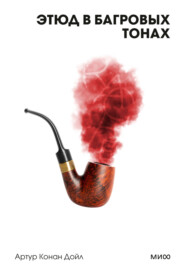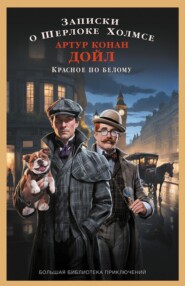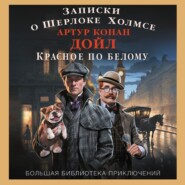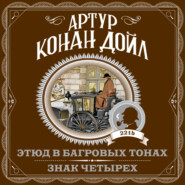По всем вопросам обращайтесь на: info@litportal.ru
(©) 2003-2025.
✖
The Exploits of Brigadier Gerard
Автор
Год написания книги
2014
Настройки чтения
Размер шрифта
Высота строк
Поля
'This is Santarem,' he said pointing.
I nodded.
'And here, twenty-five miles to the east, is Almeixal, celebrated for its vintages and for its enormous Abbey.'
Again I nodded; I could not think what was coming.
'Have you heard of the Marshal Millefleurs?' asked Massena.
'I have served with all the Marshals,' said I, 'but there is none of that name.'
'It is but the nickname which the soldiers have given him,' said Massena. 'If you had not been away from us for some months, it would not be necessary for me to tell you about him. He is an Englishman, and a man of good breeding. It is on account of his manners that they have given him his title. I wish you to go to this polite Englishman at Almeixal.'
'Yes, Marshal.'
'And to hang him to the nearest tree.'
'Certainly, Marshal.'
I turned briskly upon my heels, but Massena recalled me before I could reach the opening of his tent.
'One moment, Colonel,' said he; 'you had best learn how matters stand before you start. You must know, then, that this Marshal Millefleurs, whose real name is Alexis Morgan, is a man of very great ingenuity and bravery. He was an officer in the English Guards, but having been broken for cheating at cards, he left the army. In some manner he gathered a number of English deserters round him and took to the mountains. French stragglers and Portuguese brigands joined him, and he found himself at the head of five hundred men. With these he took possession of the Abbey of Almeixal, sent the monks about their business, fortified the place, and gathered in the plunder of all the country round.'
'For which it is high time he was hanged,' said I, making once more for the door.
'One instant!' cried the Marshal, smiling at my impatience. 'The worst remains behind. Only last week the Dowager Countess of La Ronda, the richest woman in Spain, was taken by these ruffians in the passes as she was journeying from King Joseph's Court to visit her grandson. She is now a prisoner in the Abbey, and is only protected by her – '
'Grandmotherhood,' I suggested.
'Her power of paying a ransom,' said Massena. 'You have three missions, then: To rescue this unfortunate lady; to punish this villain; and, if possible, to break up this nest of brigands. It will be a proof of the confidence which I have in you when I say that I can only spare you half a squadron with which to accomplish all this.'
My word, I could hardly believe my ears! I thought that I should have had my regiment at the least.
'I would give you more,' said he, 'but I commence my retreat today, and Wellington is so strong in horse that every trooper becomes of importance. I cannot spare you another man. You will see what you can do, and you will report yourself to me at Abrantes not later than tomorrow night.'
It was very complimentary that he should rate my powers so high, but it was also a little embarrassing. I was to rescue an old lady, to hang an Englishman, and to break up a band of five hundred assassins – all with fifty men. But after all, the fifty men were Hussars of Conflans, and they had an Etienne Gerard to lead them. As I came out into the warm Portuguese sunshine my confidence had returned to me, and I had already begun to wonder whether the medal which I had so often deserved might not be waiting for me at Almeixal.
You may be sure that I did not take my fifty men at hap-hazard. They were all old soldiers of the German wars, some of them with three stripes, and most of them with two. Oudet and Papilette, two of the best sub-officers in the regiment, were at their head. When I had them formed up in fours, all in silver grey and upon chestnut horses, with their leopard skin shabracks and their little red panaches, my heart beat high at the sight. I could not look at their weather-stained faces, with the great moustaches which bristled over their chin-straps, without feeling a glow of confidence, and, between ourselves, I have no doubt that that was exactly how they felt when they saw their young Colonel on his great black war-horse riding at their head.
Well, when we got free of the camp and over the Tagus, I threw out my advance and my flankers, keeping my own place at the head of the main body. Looking back from the hills above Santarem, we could see the dark lines of Massena's army, with the flash and twinkle of the sabres and bayonets as he moved his regiments into position for their retreat. To the south lay the scattered red patches of the English outposts, and behind the grey smoke-cloud which rose from Wellington's camp – thick, oily smoke, which seemed to our poor starving fellows to bear with it the rich smell of seething camp-kettles. Away to the west lay a curve of blue sea flecked with the white sails of the English ships.
You will understand that as we were riding to the east, our road lay away from both armies. Our own marauders, however, and the scouting parties of the English, covered the country, and it was necessary with my small troop that I should take every precaution. During the whole day we rode over desolate hill-sides, the lower portions covered by the budding vines, but the upper turning from green to grey, and jagged along the skyline like the back of a starved horse. Mountain streams crossed our path, running west to the Tagus, and once we came to a deep, strong river, which might have checked us had I not found the ford by observing where houses had been built opposite each other upon either bank. Between them, as every scout should know, you will find your ford. There was none to give us information, for neither man nor beast, nor any living thing except great clouds of crows, was to be seen during our journey.
The sun was beginning to sink when we came to a valley clear in the centre, but shrouded by huge oak trees upon either side. We could not be more than a few miles from Almeixal, so it seemed to me to be best to keep among the groves, for the spring had been an early one and the leaves were already thick enough to conceal us. We were riding then in open order among the great trunks, when one of my flankers came galloping up.
'There are English across the valley, Colonel,' he cried, as he saluted.
'Cavalry or infantry?'
'Dragoons, Colonel,' said he; 'I saw the gleam of their helmets, and heard the neigh of a horse.'
Halting my men I hastened to the edge of the wood. There could be no doubt about it. A party of English cavalry was travelling in a line with us, and in the same direction. I caught a glimpse of their red coats and of their flashing arms glowing and twinkling among the tree-trunks. Once, as they passed through a small clearing, I could see their whole force, and I judged that they were of about the same strength as my own – a half squadron at the most.
You who have heard some of my little adventures will give me credit for being quick in my decisions, and prompt in carrying them out. But here I must confess that I was in two minds. On the one hand there was the chance of a fine cavalry skirmish with the English. On the other hand, there was my mission at the Abbey of Almeixal, which seemed already to be so much above my power. If I were to lose any of my men, it was certain that I should be unable to carry out my orders. I was sitting my horse, with my chin in my gauntlet, looking across at the rippling gleams of light from the further wood, when suddenly one of these red-coated Englishmen rode out from the cover, pointing at me and breaking into a shrill whoop and halloa as if I had been a fox. Three others joined him, and one who was a bugler sounded a call, which brought the whole of them into the open. They were, as I had thought, a half squadron, and they formed a double line with a front of twenty-five, their officer – the one who had whooped at me – at their head.
For my own part, I had instantly brought my own troopers into the same formation, so that there we were, hussars and dragoons, with only two hundred yards of grassy sward between us. They carried themselves well, those red-coated troopers, with their silver helmets, their high white plumes, and their long, gleaming swords; while, on the other hand, I am sure that they would acknowledge that they had never looked upon finer light horsemen than the fifty hussars of Conflans who were facing them. They were heavier, it is true, and they may have seemed the smarter, for Wellington used to make them burnish their metal work, which was not usual among us. On the other hand, it is well known that the English tunics were too tight for the sword-arm, which gave our men an advantage. As to bravery, foolish, inexperienced people of every nation always think that their own soldiers are braver than any others. There is no nation in the world which does not entertain this idea. But when one has seen as much as I have done, one understands that there is no very marked difference, and that although nations differ very much in discipline, they are all equally brave – except that the French have rather more courage than the rest.
Well, the cork was drawn and the glasses ready, when suddenly the English officer raised his sword to me as if in a challenge, and cantered his horse across the grassland. My word, there is no finer sight upon earth than that of a gallant man upon a gallant steed! I could have halted there just to watch him as he came with such careless grace, his sabre down by his horse's shoulder, his head thrown back, his white plume tossing – youth and strength and courage, with the violet evening sky above and the oak trees behind. But it was not for me to stand and stare. Etienne Gerard may have his faults, but, my faith, he was never accused of being backward in taking his own part. The old horse, Rataplan, knew me so well that he had started off before ever I gave the first shake to the bridle.
There are two things in this world that I am very slow to forget: the face of a pretty woman, and the legs of a fine horse. Well, as we drew together, I kept on saying, 'Where have I seen those great roan shoulders? Where have I seen that dainty fetlock?' Then suddenly I remembered, and as I looked up at the reckless eyes and the challenging smile, whom should I recognize but the man who had saved me from the brigands and played me for my freedom – he whose correct title was Milor the Hon. Sir Russell Bart!
'Bart!' I shouted.
He had his arm raised for a cut, and three parts of his body open to my point, for he did not know very much about the use of the sword. As I brought my hilt to the salute he dropped his hand and stared at me.
'Halloa!' said he. 'It's Gerard!' You would have thought by his manner that I had met him by appointment. For my own part, I would have embraced him had he but come an inch of the way to meet me.
'I thought we were in for some sport,' said he. 'I never dreamed that it was you.'
I found this tone of disappointment somewhat irritating. Instead of being glad at having met a friend, he was sorry at having missed an enemy.
'I should have been happy to join in your sport, my dear Bart,' said I. 'But I really cannot turn my sword upon a man who saved my life.'
'Tut, never mind about that.'
'No, it is impossible. I should never forgive myself.'
'You make too much of a trifle.'
'My mother's one desire is to embrace you. If ever you should be in Gascony – '
'Lord Wellington is coming there with 60,000 men.'
'Then one of them will have a chance of surviving,' said I, laughing. 'In the meantime, put your sword in your sheath!'
Our horses were standing head to tail, and the Bart put out his hand and patted me on the thigh.
'You're a good chap, Gerard,' said he. 'I only wish you had been born on the right side of the Channel.'
'I was,' said I.
'Poor devil!' he cried, with such an earnestness of pity that he set me laughing again. 'But look here, Gerard,' he continued; 'this is all very well, but it is not business, you know. I don't know what Massena would say to it, but our Chief would jump out of his riding-boots if he saw us. We weren't sent out here for a picnic – either of us.'
'What would you have?'
'Well, we had a little argument about our hussars and dragoons, if you remember. I've got fifty of the Sixteenth all chewing their carbine bullets behind me. You've got as many fine-looking boys over yonder, who seem to be fidgeting in their saddles. If you and I took the right flanks we should not spoil each other's beauty – though a little blood-letting is a friendly thing in this climate.'
There seemed to me to be a good deal of sense in what he said. For the moment Mr Alexis Morgan and the Countess of La Ronda and the Abbey of Almeixal went right out of my head, and I could only think of the fine level turf and of the beautiful skirmish which we might have.

















